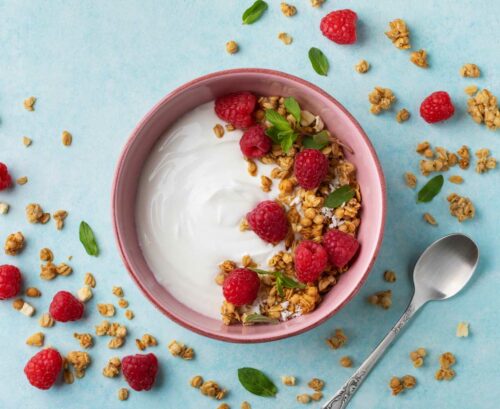
Full fat or low fat? Plant-based or dairy? Plain or flavoured? With plenty of choice in the chiller, HFG helps you choose the healthiest yoghurt for you.
Whether as part of your brekkie bowl, a daytime snack or an after-dinner nibble, yoghurt is a delicious and versatile kitchen staple. But choosing a ‘healthy’ yoghurt can be a little overwhelming, given the extensive and ever-evolving range of yoghurts now available. If you’re a yoghurt lover, here’s how to pick the best of the bunch.
Why is yoghurt good for you?
Eating dairy foods such as yoghurt, milk and cheese has a range of health perks, with research linking dairy consumption to a reduced risk of heart disease and type 2 diabetes.
Yoghurt, in particular, is:
- Bone strengthening because it is rich in calcium. Some varieties contain more than 40 per cent of your daily calcium needs in a single serve.
- Hunger busting, thanks to its protein content. Some brands offer the same amount of protein per serve as a small fillet of steak!
- Gut boosting, due to good bacteria known as probiotics, which some brands add to their yoghurt.
How to choose the healthiest yoghurt
Yoghurt is usually plain or flavoured. Plain, unsweetened yoghurt is generally the healthiest choice — but sometimes that can get a little boring! If flavoured yoghurt is more to your taste, choose one made from real fruits with little added sugar.
Natural or plain has no added flavours or sweeteners, and is sour in taste. It is usually a healthy and versatile choice.
Greek is thicker than natural yoghurt and has a creamier taste. It is often higher in protein and can also be a nutritious option.
Icelandic is similar to Greek-style yoghurt, but even thicker. It has a higher protein and calcium content and is usually the healthiest choice.
Fitness-focused is low in kilojoules/calories and high in protein, but can be lower in all-important calcium. These yoghurts can be made with artificial sweeteners and protein powders.
Lactose free contains the enzyme lactase which breaks down the natural sugar (known as lactose) in dairy foods. It is a good option for people who are lactose intolerant.
Plant-based is made from soy, nuts or coconut. These have a health halo but are not actually healthier than dairy-based yoghurts. They usually lack the calcium dairy foods provide and, if made from coconut, are high in unhealthy saturated fat.
What to look for when choosing yoghurt:
- A short and simple ingredients list of milk, milk solids and live cultures
- More than 170mg calcium per 100g
- Reduced-fat if you have heart disease or high cholesterol
- Less than 10g sugar per 100g.
How much yoghurt is ideal to eat?
A serve of yoghurt = ¾ cup (200g)
- Women are recommended to have 2½ serves per day until the age of 50 and four serves per day after then
- Men are recommended to have 2½ serves of dairy foods like yoghurt, milk and cheese each and every day until the age of 70 and 3½ serves per day after then.
You might be interested in these recipes:
www.healthyfood.com










